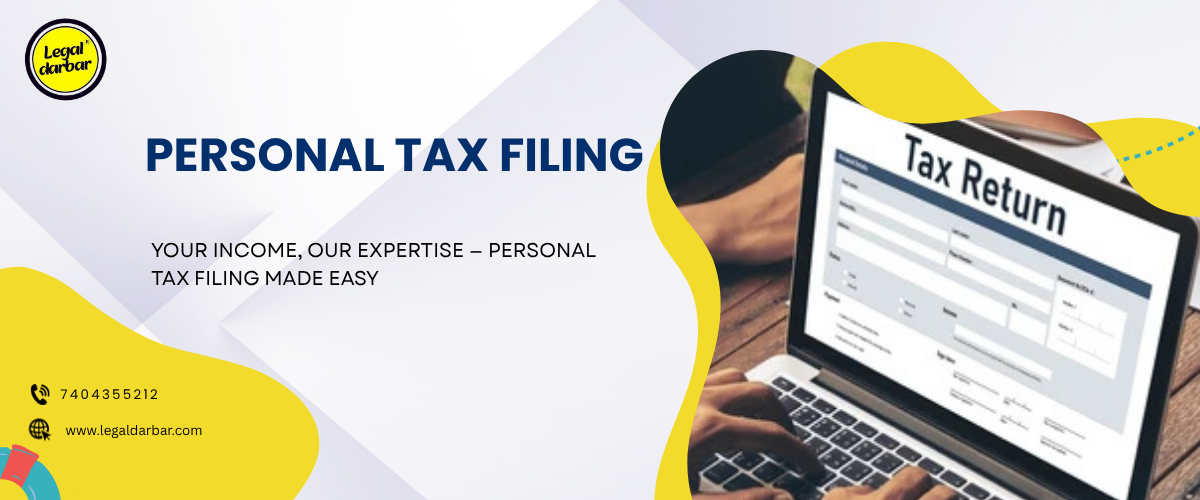
Personal Tax Filing
Filing your income tax return (ITR) is more than just a yearly task — it’s a legal responsibility and a sign of financial discipline. Whether you’re a salaried employee, freelancer, or small business owner, timely and accurate personal tax filing helps you stay compliant, avoid penalties, and even get refunds.
In this guide by Legal Darbar, learn everything you need to know about personal ITR filing in India — who needs to file, which ITR form to choose, documents required, due dates, and how we can help make the process stress-free.
What is Personal Income Tax Filing?
Personal tax filing means submitting your income details to the Income Tax Department of India for a specific financial year. You declare your income, deductions, tax paid (TDS), and other relevant details through an Income Tax Return (ITR) form.
This return helps the government assess whether you’ve paid the correct amount of tax and whether you’re due for a refund or need to pay additional tax.
Who Should File an Income Tax Return?
Filing ITR is mandatory for the following individuals:
-
Annual income exceeds ₹2.5 lakhs (₹3 lakhs for senior citizens, ₹5 lakhs for super seniors)
-
Salaried individuals with income from one or more employers
-
Freelancers, professionals, and self-employed individuals
-
Individuals earning rental or capital gains income
-
Residents with foreign income or foreign assets
-
Individuals claiming a tax refund
-
People who have paid TDS but need to reconcile or claim deductions
Documents Required for Personal Tax Filing
Income Proof
-
Form 16 (from employer)
-
Salary slips
-
Bank account statements
-
Form 26AS or AIS/TIS (from income tax portal)
-
Capital gains statements (from shares, mutual funds, or property)
Investment & Deduction Proofs
-
Life insurance, PPF, ELSS (80C)
-
Medical insurance (80D)
-
Home loan interest certificate (80EE/80E)
-
Education loan interest, donation receipts, etc.
Other Essentials
-
PAN Card
-
Aadhaar Card
-
Bank details for refund
-
Rent receipts (for HRA)
-
Foreign income (if applicable)
Which ITR Form Should You File?
| Form | Who Should Use It |
|---|---|
| ITR-1 (Sahaj) | Salaried individuals, income up to ₹50 lakhs |
| ITR-2 | Individuals with capital gains or foreign assets |
| ITR-3 | Professionals, freelancers, and business income |
| ITR-4 (Sugam) | Presumptive income scheme (business/profession) |
Not sure which form is right for you? Legal Darbar will guide you based on your profile.
Benefits of Filing Your Personal ITR
-
Avoid legal penalties
-
Get income tax refunds
-
Acts as income proof for loans or visas
-
Carry forward losses for future adjustments
-
Builds your financial profile
Why Choose Legal Darbar for ITR Filing?
Legal Darbar offers easy, affordable & expert-driven income tax filing services:
-
1-on-1 assistance with a tax expert
-
Error-free ITR filing
-
Data privacy and security
-
Refund tracking & processing
-
On-time submission guaranteed
Conclusion:
Filing your personal income tax return is not just a compliance requirement — it’s your financial responsibility and opportunity to claim refunds, declare investments, and build creditworthiness.
With Legal Darbar, personal ITR filing becomes simple, fast, and error-free. Let us help you stay compliant and worry-free.
Frequently Asked Questions (FAQs):
Yes, and it’s recommended — especially if you want to claim a TDS refund, carry forward losses, or show income proof.
You can file a belated return with a penalty, but you may lose the chance to carry forward losses or get timely refunds.
Yes. If you’ve made an error, you can file a revised return before 31st December of the assessment year.
Yes, linking your PAN with Aadhaar is mandatory. Without it, your return may be declared invalid.
Refunds usually take 7–45 days after successful ITR processing by the Income Tax Department.
